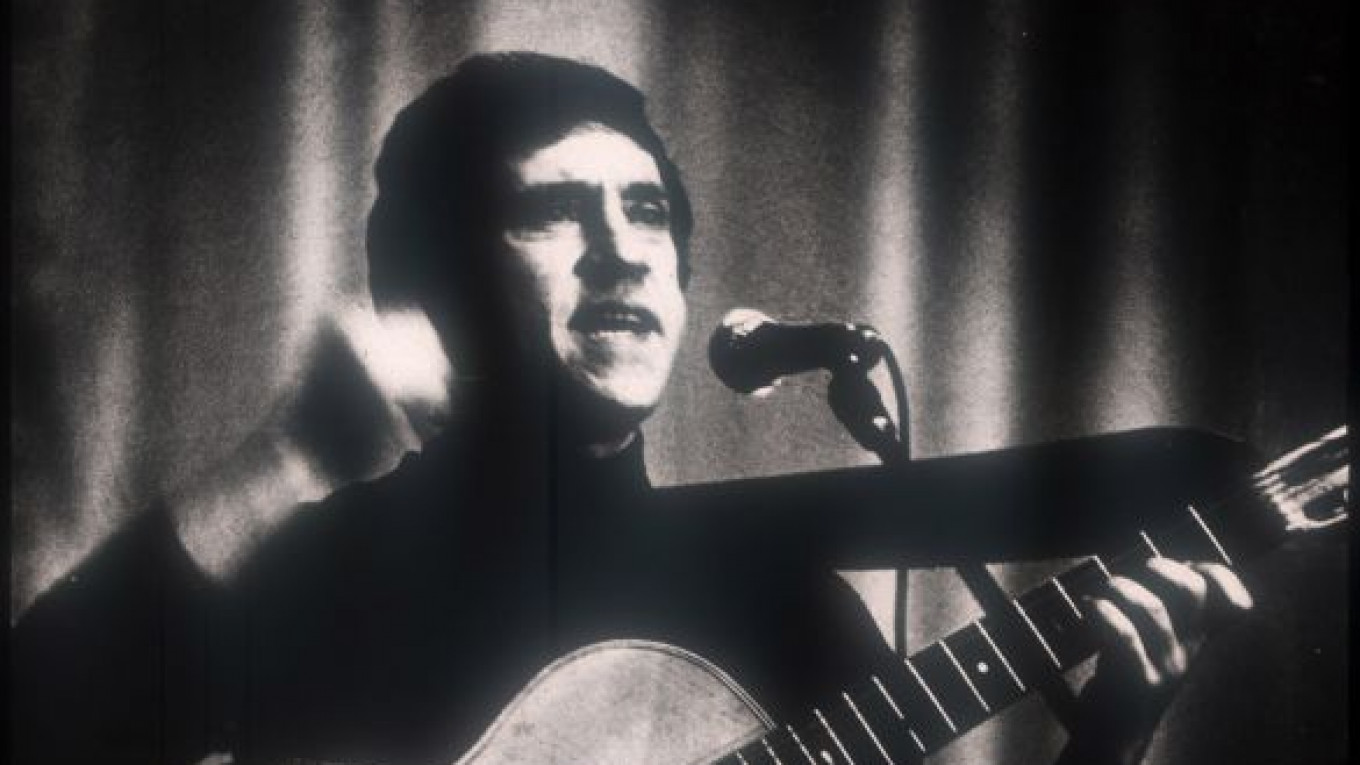In a grim Soviet reality, he lived the lifestyle of a playboy. While not being a dissident, he sang satirical songs. While not writing a single song that would praise the authorities, he wrote ballads about World War II and was a symbol of patriotism for many Russians.
Vladimir Vysotsky, a bard singer, poet and actor who would have turned 75 on Friday, still remains one of the most outstanding national icons. His birthday was widely marked by Russians as well as foreign fans over the weekend.
Several concerts and exhibitions in honor of Vysotsky took place across Russia, including in Tambov, Penza, St. Petersburg and Moscow. In Rostov, fans placed a rock on the spot where they will later erect a monument to the singer.
Vysotsky’s son, Nikita, attended an opening of a museum to his father in Yekaterinburg, where locals and visitors can see the poet’s restored Mercedes, his wax statue, clothes and personal trinkets.
Even if they did not manage to get access to the festivals, Russians could watch a variety of Vysotsky-related television programs to mark the day. Channel One showed the film “Vysotsky: Thank God I’m Alive,” which is based on a real-life episode in the artist’s life. Meanwhile, Kultura and TV Tsentr broadcast his documentary footage.
The celebrations were not limited to Russia. The staff of Poland’s Vladimir Vysotsky Museum in Koszalin held an international festival of documentary films and organized an exhibition of archived materials, including footage of Vysotsky rehearsing his role in “Vishnyovy Sad” and photographs from his Taganka Theater’s French tour in 1977. Festival guests came from as far away as Iran, Jordan and Oman.
One of the documentary films shown on Rossia 1, titled “Vladimir Vysotsky: A Letter to Warren Beatty,” shows Vysotsky appealing to the acclaimed American actor in English. The film was recorded in Moscow and was the Russian singer’s introduction to an actor who was considering him for a role in his film “Reds,” about the life of the American communist journalist John Reed.
Vysotsky, who died more than 30 years ago, has cult status in Russia. The legendary Soviet chess master Boris Spassky never crossed paths with the singer but explained his appeal the best.
“He was able to find a path into every heart. This unique gift made him the people’s singer,” Spassky said Saturday during an interview on a television show dedicated to the poet’s legacy.
“His songs have made many people think, ‘Do we really live in the world’s best country?’ Under the influence of his songs, I started to realize that it is not the way it is,” said Vera Shirokaya, a retired railroad company employee from Irkutsk.
Shirokaya said she remembers retyping a short book of Vysotsky’s poetry, which was published by the underground press because it was not possible to obtain it officially. Shirokaya gave the book to her colleague, who later lost it.
“I felt very sad, not because I valued my labor so much but because we couldn’t read it ourselves. We were typing fast and had no time to get the essence of the poetry,” she said.
But while Shirokaya spent a big part of her life in the period that Vysotsky sang about, critic Yury Saprykin lamented that the younger generation doesn’t recognize a lot of the famous quotes from the poet’s songs.
“There are no playlists combined with his songs in VKontakte ,” he wrote in an article in Afisha magazine, referring to a popular Russian social networking site.
Saprykin stated in the article that while trying to present Vysotsky to a younger audience, movie producers have tried to depict him as an action hero of the “drugs, sex and rock-n-roll type.” One such depiction can be seen in “Vysotsky: Thank God I’m Alive,” which was released in 2011.
The film, which is based on the real-life episode of Vysotsky’s clinical death in Uzbekistan during a concert, focuses more on his romantic relationships and love of racing his Mercedes than on his songs.
While the film became a popular blockbuster and collected $27.4 million in theaters, critics who knew Vysotsky said that it failed to capture his essence.
“His songs were an encyclopedia of Russian life, but now, for some reason, they have stopped being such,” Saprykin wrote in his article, referring to a quote by Russian critic Vissarion Belinsky, who called an Alexander Pushkin novel an “encyclopedia of Russian life.”
Contact the author at a.bratersky@imedia.ru
Related articles:
A Message from The Moscow Times:
Dear readers,
We are facing unprecedented challenges. Russia's Prosecutor General's Office has designated The Moscow Times as an "undesirable" organization, criminalizing our work and putting our staff at risk of prosecution. This follows our earlier unjust labeling as a "foreign agent."
These actions are direct attempts to silence independent journalism in Russia. The authorities claim our work "discredits the decisions of the Russian leadership." We see things differently: we strive to provide accurate, unbiased reporting on Russia.
We, the journalists of The Moscow Times, refuse to be silenced. But to continue our work, we need your help.
Your support, no matter how small, makes a world of difference. If you can, please support us monthly starting from just $2. It's quick to set up, and every contribution makes a significant impact.
By supporting The Moscow Times, you're defending open, independent journalism in the face of repression. Thank you for standing with us.
Remind me later.






